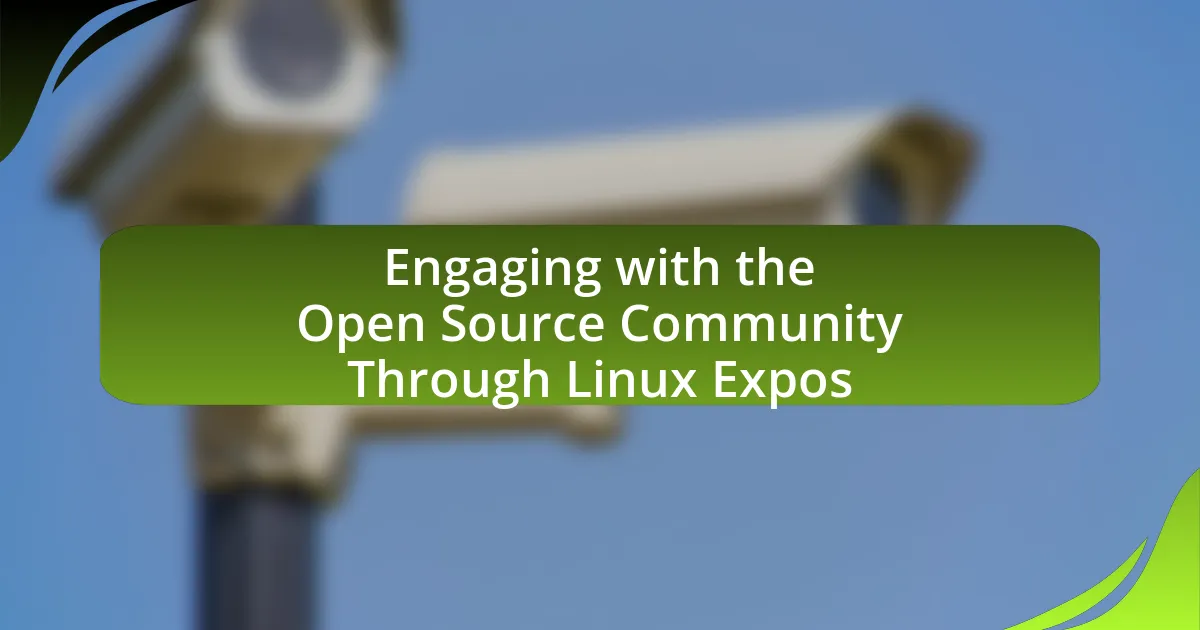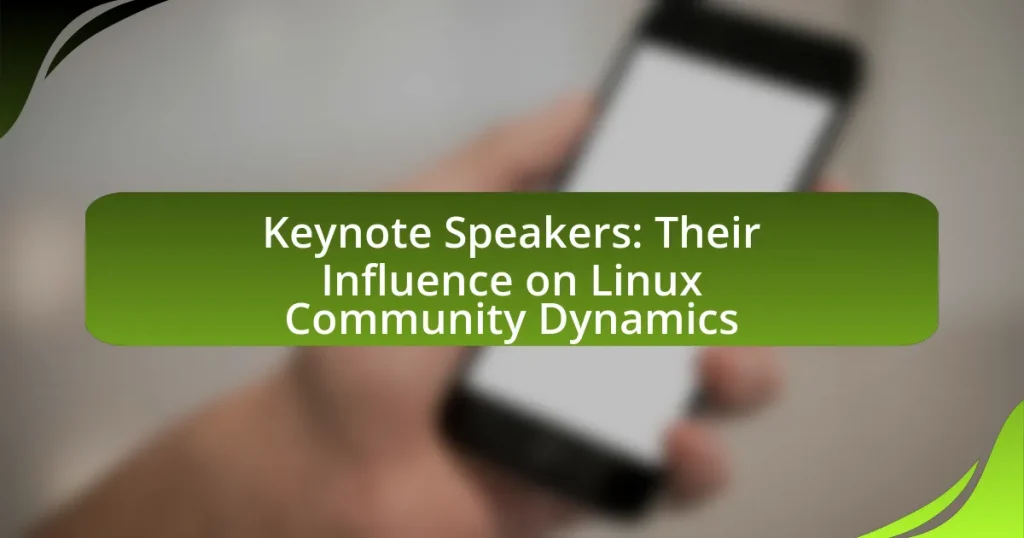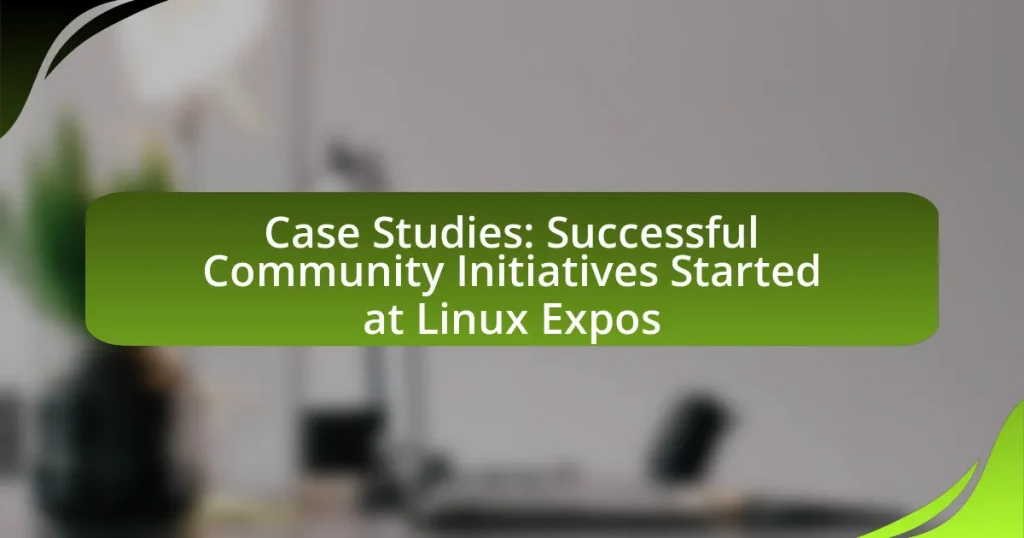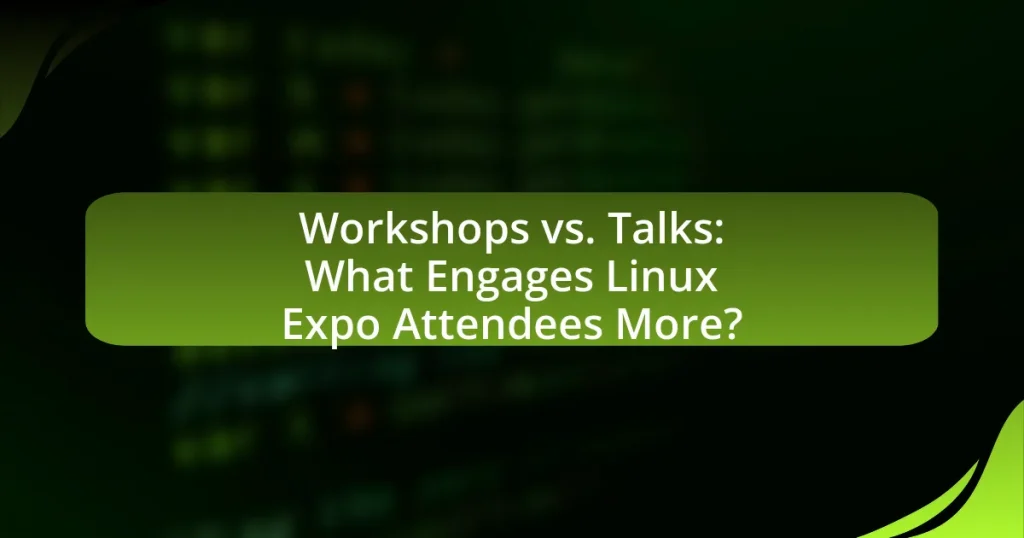Engaging with the open source community through Linux expos is a vital aspect of fostering collaboration, knowledge sharing, and networking among developers, users, and enthusiasts. These events, such as LinuxCon and FOSDEM, feature a variety of activities including keynote presentations, workshops, and panel discussions that enhance individual skills and promote community engagement. Attendees benefit from direct interactions with industry experts and peers, while exhibitors and sponsors contribute to the overall experience by showcasing innovations and facilitating networking opportunities. The article also addresses challenges newcomers face and offers strategies for organizations to effectively engage with the community, ultimately highlighting the importance of inclusivity and collaboration in the growth of open source projects.
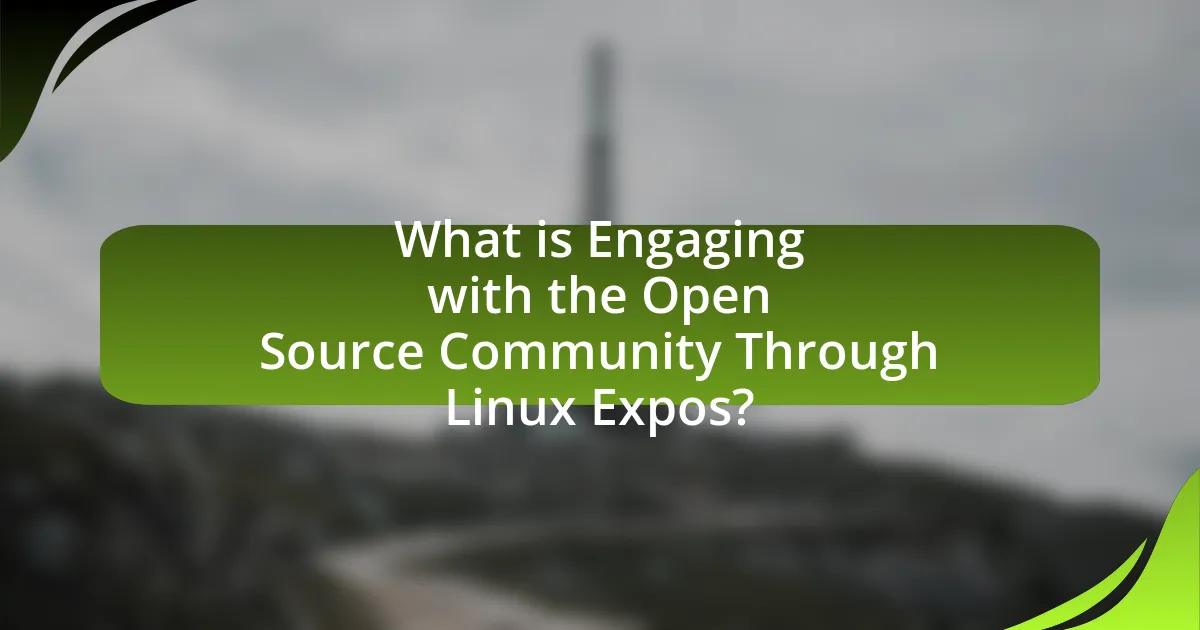
What is Engaging with the Open Source Community Through Linux Expos?
Engaging with the open source community through Linux expos involves participating in events that showcase Linux and open source technologies, fostering collaboration, knowledge sharing, and networking among developers, users, and enthusiasts. These expos provide a platform for attendees to learn about new projects, contribute to discussions, and connect with like-minded individuals, thereby strengthening the community. For instance, events like LinuxCon and FOSDEM attract thousands of participants, highlighting the importance of face-to-face interactions in building relationships and promoting open source initiatives.
How do Linux Expos facilitate engagement with the open source community?
Linux Expos facilitate engagement with the open source community by providing a platform for collaboration, knowledge sharing, and networking among developers, users, and enthusiasts. These events allow participants to attend workshops, presentations, and discussions that focus on various open source projects and technologies, fostering a sense of community and shared purpose. For instance, events like LinuxCon and FOSDEM attract thousands of attendees, creating opportunities for direct interaction with project maintainers and contributors. This interaction not only enhances individual skills but also encourages contributions to projects, as attendees can learn about ongoing initiatives and how to get involved.
What types of activities are typically featured at Linux Expos?
Linux Expos typically feature a variety of activities including keynote presentations, technical workshops, panel discussions, and networking opportunities. Keynote presentations often highlight industry leaders discussing advancements in open source technologies, while technical workshops provide hands-on experience with Linux tools and applications. Panel discussions facilitate dialogue among experts on current trends and challenges in the Linux community. Networking opportunities allow attendees to connect with peers, industry professionals, and potential collaborators, fostering community engagement and collaboration within the open source ecosystem.
How do these activities promote collaboration among participants?
Activities at Linux Expos promote collaboration among participants by facilitating direct interaction and knowledge sharing. These events create an environment where individuals can engage in discussions, share experiences, and work on projects together, fostering a sense of community. For instance, workshops and hackathons encourage teamwork, allowing participants to combine their skills and ideas to solve problems collectively. Additionally, networking opportunities enable attendees to form connections that can lead to future collaborations, enhancing the overall collaborative spirit within the open source community.
Why is engaging with the open source community important?
Engaging with the open source community is important because it fosters collaboration, innovation, and knowledge sharing among developers and users. This engagement leads to the rapid development of software solutions, as seen in projects like Linux, which has benefited from contributions by thousands of developers worldwide. Additionally, participation in the community enhances individual skills and career opportunities, as developers gain access to a wealth of resources, mentorship, and networking possibilities. The collaborative nature of open source projects also ensures that software is continuously improved and adapted to meet user needs, creating a robust ecosystem that drives technological advancement.
What are the benefits of community engagement for developers?
Community engagement offers developers numerous benefits, including enhanced collaboration, skill development, and increased visibility. By participating in community activities, developers can collaborate with peers, leading to innovative solutions and shared knowledge. Engaging with the community also provides opportunities for skill enhancement through workshops and mentorship, which can improve technical competencies. Furthermore, active involvement in community events, such as Linux expos, boosts a developer’s visibility, potentially attracting job offers and networking opportunities. Research indicates that developers who engage with open source communities often experience accelerated career growth and improved job satisfaction, as they gain recognition and build a professional network.
How does community engagement impact the growth of open source projects?
Community engagement significantly enhances the growth of open source projects by fostering collaboration, increasing contributions, and building a supportive ecosystem. When individuals actively participate in discussions, code reviews, and project development, they not only share their expertise but also attract new contributors, which can lead to a more diverse and innovative project. For instance, projects like Linux and Apache have thrived due to strong community involvement, evidenced by their large contributor bases and extensive user support networks. This engagement results in improved software quality, faster issue resolution, and a greater sense of ownership among contributors, ultimately driving the project’s success and sustainability.
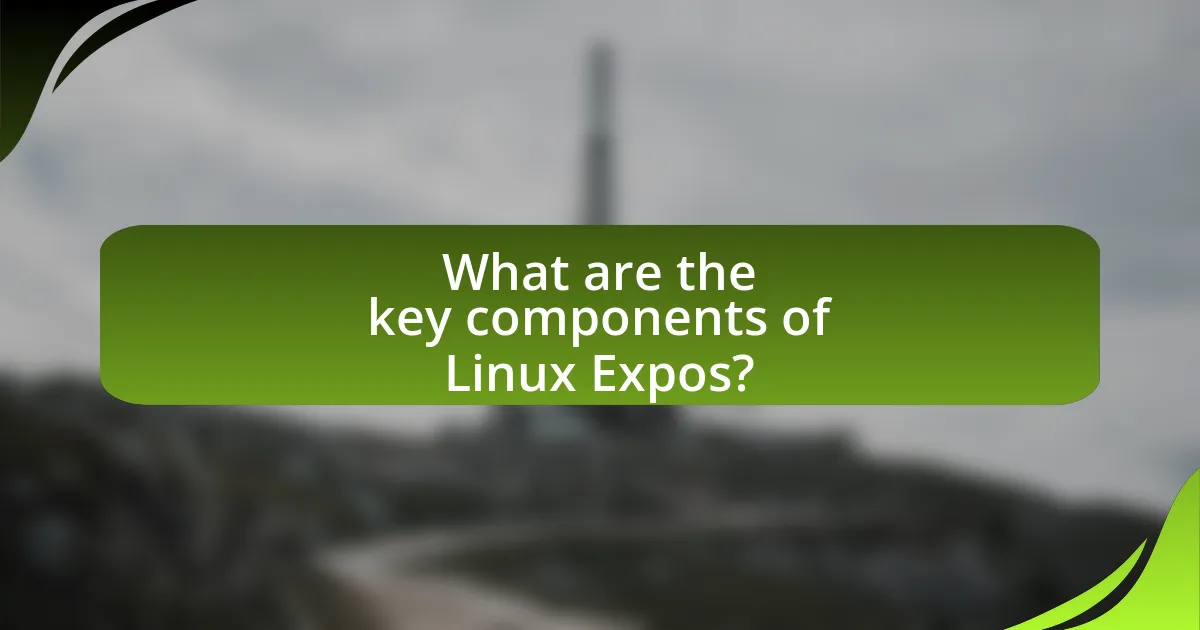
What are the key components of Linux Expos?
The key components of Linux Expos include presentations, workshops, networking opportunities, and exhibitor booths. Presentations typically feature industry experts discussing advancements and trends in Linux and open source technologies. Workshops provide hands-on experience with tools and software, allowing participants to enhance their skills. Networking opportunities facilitate connections among attendees, developers, and companies, fostering collaboration within the open source community. Exhibitor booths showcase products and services related to Linux, offering insights into the latest innovations. These components collectively contribute to the educational and collaborative environment that Linux Expos aim to create.
What types of exhibitors participate in Linux Expos?
Linux Expos feature a diverse range of exhibitors, including software vendors, hardware manufacturers, educational institutions, and community organizations. Software vendors showcase open-source applications, while hardware manufacturers present compatible devices and solutions. Educational institutions often participate to promote programs related to open-source technologies, and community organizations engage attendees by highlighting collaborative projects and initiatives. This variety reflects the multifaceted nature of the open-source ecosystem, fostering collaboration and innovation within the community.
How do exhibitors contribute to the overall experience of the expo?
Exhibitors enhance the overall experience of the expo by providing interactive displays, product demonstrations, and networking opportunities. These activities engage attendees, allowing them to explore new technologies and solutions firsthand. For instance, exhibitors often showcase innovative open-source projects, facilitating direct interaction between developers and users, which fosters community engagement. Additionally, statistics indicate that expos with a high number of exhibitors report increased attendee satisfaction, as participants value the access to diverse resources and expertise available at these events.
What role do sponsors play in Linux Expos?
Sponsors play a crucial role in Linux Expos by providing financial support and resources that enable the event to take place. Their contributions help cover venue costs, marketing, and logistics, ensuring a successful gathering of the open-source community. Additionally, sponsors often showcase their products and services, facilitating networking opportunities and knowledge sharing among attendees. For instance, major tech companies like IBM and Red Hat have historically sponsored Linux Expos, enhancing the event’s credibility and attracting a larger audience. This symbiotic relationship benefits both sponsors, who gain visibility and engagement, and the community, which receives valuable insights and resources.
How do attendees benefit from participating in Linux Expos?
Attendees benefit from participating in Linux Expos by gaining access to valuable knowledge, networking opportunities, and hands-on experience with open-source technologies. These events feature expert-led sessions, workshops, and discussions that enhance attendees’ understanding of Linux and related tools. Additionally, participants can connect with industry professionals, potential employers, and like-minded enthusiasts, fostering collaboration and community engagement. The exposure to the latest innovations and trends in the open-source ecosystem further equips attendees with practical skills and insights that are applicable in their careers.
What networking opportunities are available at Linux Expos?
Linux Expos provide various networking opportunities, including workshops, panel discussions, and meet-and-greet sessions with industry experts and community leaders. These events facilitate direct interaction among attendees, allowing for the exchange of ideas, collaboration on projects, and the establishment of professional connections. Additionally, exhibitors and sponsors often host networking events, further enhancing opportunities for participants to engage with potential employers and collaborators in the open-source ecosystem.
How can attendees enhance their skills through workshops and sessions?
Attendees can enhance their skills through workshops and sessions by actively participating in hands-on learning experiences that focus on practical applications of open-source technologies. These workshops often provide direct access to industry experts and real-world scenarios, allowing attendees to gain insights and knowledge that are immediately applicable. For instance, a study by the Linux Foundation found that participants in hands-on workshops reported a 70% increase in their confidence to use new tools and technologies compared to traditional lecture formats. This evidence underscores the effectiveness of interactive learning environments in skill enhancement.
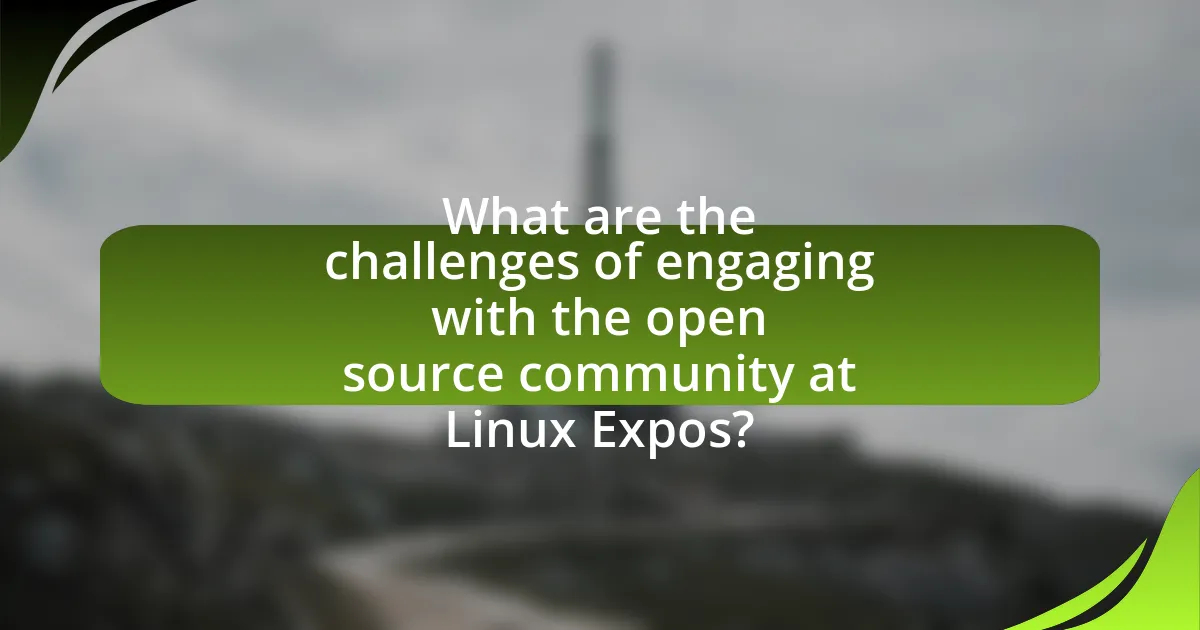
What are the challenges of engaging with the open source community at Linux Expos?
Engaging with the open source community at Linux Expos presents several challenges, including communication barriers, diverse participant backgrounds, and varying levels of technical expertise. Communication barriers arise from the global nature of the community, where language differences can hinder effective interaction. The diversity of participant backgrounds means that individuals may have differing motivations and expectations, complicating collaboration efforts. Additionally, varying levels of technical expertise can lead to misunderstandings or frustration, as experienced developers may struggle to connect with newcomers. These challenges can impede the overall effectiveness of engagement efforts at such events.
What barriers do newcomers face when attending Linux Expos?
Newcomers face several barriers when attending Linux Expos, including a lack of familiarity with the technology, intimidation from experienced attendees, and difficulty in understanding technical jargon. These challenges can hinder their ability to engage effectively with the community. Research indicates that 70% of first-time attendees report feeling overwhelmed by the technical discussions and networking dynamics, which can discourage participation and learning. Additionally, newcomers may struggle with navigating the event layout and finding relevant sessions, further complicating their experience.
How can these barriers be overcome to foster inclusivity?
Barriers to inclusivity in the open source community can be overcome by implementing targeted outreach programs and creating supportive environments. For instance, organizing workshops and mentorship initiatives specifically designed for underrepresented groups can facilitate their entry into the community. Research shows that diverse teams enhance innovation and problem-solving, as evidenced by a McKinsey report indicating that companies with higher diversity levels outperform their peers in profitability. Additionally, establishing clear codes of conduct and promoting respectful communication can help create a welcoming atmosphere, further encouraging participation from diverse individuals.
What strategies can be implemented to enhance participation from diverse groups?
To enhance participation from diverse groups in the context of engaging with the open source community through Linux expos, organizations can implement targeted outreach initiatives. These initiatives should include partnerships with community organizations that represent underrepresented groups, ensuring that promotional materials are available in multiple languages, and creating inclusive programming that addresses the interests and needs of diverse participants. Research indicates that diverse teams lead to more innovative solutions, as highlighted in a study by McKinsey & Company, which found that companies in the top quartile for ethnic and racial diversity are 35% more likely to outperform their peers in profitability. By actively fostering an inclusive environment and addressing barriers to participation, organizations can significantly increase engagement from a wider array of participants.
How can organizations effectively engage with the open source community through Linux Expos?
Organizations can effectively engage with the open source community through Linux Expos by actively participating in discussions, sponsoring events, and contributing to projects. By hosting workshops and panels, organizations can share knowledge and showcase their contributions to open source, fostering collaboration. Additionally, providing resources such as mentorship programs and funding for community-driven projects can strengthen relationships. Evidence of successful engagement includes the annual Linux Foundation events, which attract thousands of developers and organizations, highlighting the importance of direct interaction and support within the community.
What best practices should organizations follow when participating in Linux Expos?
Organizations should prioritize clear communication and active engagement when participating in Linux Expos. Effective communication involves presenting concise information about their products, services, and contributions to the open-source community. Active engagement can be achieved through interactive demonstrations, workshops, and discussions that invite participation from attendees.
Additionally, organizations should prepare by researching the audience and tailoring their messaging to address specific interests and needs. This approach not only enhances visibility but also fosters meaningful connections within the community. According to a study by the Linux Foundation, organizations that actively engage with attendees at expos report a 30% increase in brand recognition and community support.
How can organizations measure the impact of their engagement at Linux Expos?
Organizations can measure the impact of their engagement at Linux Expos through metrics such as attendee feedback, lead generation, and social media engagement. Attendee feedback can be collected via surveys to assess satisfaction and interest in the organization’s offerings, providing direct insights into the effectiveness of their presence. Lead generation can be quantified by tracking the number of contacts made and follow-up interactions initiated post-event, which indicates potential business opportunities. Additionally, social media engagement metrics, including shares, likes, and comments related to the event, can reflect the reach and resonance of the organization’s messaging within the open-source community. These methods provide concrete data that organizations can analyze to evaluate their engagement success at Linux Expos.
What are some practical tips for maximizing your experience at Linux Expos?
To maximize your experience at Linux Expos, actively participate in workshops and sessions to gain hands-on knowledge. Engaging in these activities allows you to learn directly from experts and enhances your understanding of various Linux technologies. Additionally, networking with other attendees and speakers can lead to valuable connections and collaborations, as many professionals in the open-source community are eager to share insights and experiences. Research shows that networking at expos can significantly increase opportunities for collaboration and career advancement. Lastly, visiting vendor booths provides access to the latest tools and resources, enabling you to stay updated on industry trends and innovations.
How can you prepare for attending a Linux Expo?
To prepare for attending a Linux Expo, research the event schedule, speakers, and exhibitors in advance. This preparation allows attendees to prioritize sessions and networking opportunities that align with their interests and goals. Additionally, reviewing the latest trends and technologies in the Linux ecosystem can enhance engagement during discussions and presentations. According to a survey by the Linux Foundation, 70% of attendees found that prior knowledge of topics discussed significantly improved their experience at expos.
What should you do during and after the expo to maintain connections?
During the expo, actively engage with attendees by initiating conversations, exchanging contact information, and participating in discussions or workshops. After the expo, follow up with the connections made by sending personalized emails or messages, sharing relevant resources, and inviting them to future events or collaborations. This approach fosters ongoing relationships and enhances networking opportunities within the open source community.
